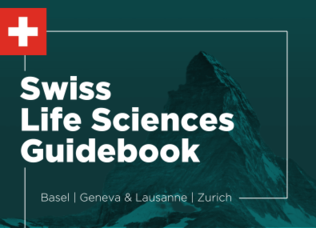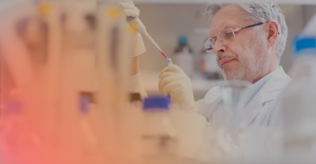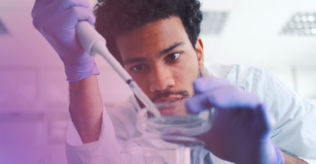Charlotte Mears:
So, Maureen, thank you so much for joining us today. We’re here celebrating International Women in Science Day. Firstly, wanted to get a bit of an overview, Maureen of what you've been doing within the life sciences industry and your background, if you don't mind?
Maureen Deehan:
Thank you, Charlotte. Yes so, I did my PHD many years ago at the department of Glasgow University department of medicine. I did cardiovascular medicine and then I stayed in the university, academic area for 8 years as a post-doc and then, in 2001, I moved into industry. I’ve worked in a variety of medium biotech to large pharma and had a variety of different roles. However, in the last almost 12 years now, I actually moved out of the UK and I have been working in Switzerland and I am currently the Chief Business & Operating Officer for Cambridge, Boston spin-out company from MIT. I’ve been doing that now for the last 2 months and really, what my current role is, is to help move some of our products into the clinic and hopefully then into approval and also to establish collaborations with other companies.
Charlotte Mears:
That's fantastic. I mean, it's incredible to see how inspiring you've been in the places you've got to within the life sciences industry. What made you get into life sciences in the first instance?
Maureen Deehan:
So, I was very fortunate that the secondary school that I attended was close to Glasgow city centre and was a brand-new school. It had brand new facilities and had fantastic science labs and also, when I look back, I was also really fortunate I had young teachers in science and in particular a couple of young women who taught chemistry and biology. I think they were fresh out of teacher training and very motivated. They played a big part in my deciding to go to university and study initially biochemistry and pharmacology. When I was finishing my degree, as part of the process of having interviews and I wasn’t sure on PhD or move to a company. Actually, I had an interview with Pfizer in London and had a chat with them and I realised at that point in time I wanted to move into life science, I wanted to lead a research team and they advised me to go back and finish my PhD, which I did. Then, as I already said, I worked in the university for several years because that was what was really needed then to be able to go into the life sciences in a team leader role. So again, I was fortunate to have people and a nice environment and people who motivated me while at school.
Charlotte Mears:
Brilliant! Obviously, speaking about success, have there been any massive successes within your career that you wanted to highlight?
Maureen Deehan:
Yeah, two spring to mind. I was very proud when I got my PhD because I was one of the first members of my family to complete such a study. And obviously, I was happy, my parents were happy and so was my family.
But I guess one of a real career, important moment was when I initially moved to Switzerland – which was in 2011 – I joined a company called NOVAMUNE who were based in Geneva and at that point in time they were working on a type of antibody-drug for rare orphan paediatric indication - so for children. It was called hemophagocytic lymphohistiocytosis, which was quite difficult to say and for me, what I was proud about was that the studies were at quite early stages. And I had to play a big part with working with all my colleagues to help develop assays to get the molecule through the clinic and it was finally approved in November 2018 and it was actually sold to another company.
But the bit that I’m particularly proud about is as part of this process - I am actually currently in New York for a conference – however, what I used to do every summer, during the month of July, I would come to New York and one of the patient associations for that particular disease, the patients would come and the adults and the family members would come and I would participate in a 5k run around the Hudson Bay area. What was really remarkable was how appreciative the parents and the patients were about what we were doing, so when the drug was finally approved, not only did I find is a good career accomplishment for the company and my colleagues, but I had actually spent personal time with some of these patients who received the drug. That’s been one of the most important moments in my career to date.
Charlotte Mears:
I mean, must be incredibly rewarding to be able to be with the families and be with the patients and support them through that. That could inspire anyone, I guess into going into life Sciences is seeing the end result of this! Is there anything, in particular, you would say, adding to this, that you would say to inspire young women to get into the life sciences industry?
Maureen Deehan:
Yeah, so for me what I am inspired about is patients and helping patients. I think life is precious and we are all entitled to having a good life and I think sometimes we can become a little bit complacent about our health and even with friends and family members over the years, I can understand what it’s like when people get sick. So, I like to work on new drugs and new technologies etc. where it can improve the quality of life of patients and therefore their caregivers and their families. So, for me, that’s what gets me out of bed each day, knowing that I’m doing something that’s helping others. I am sure other women will relate to that from a job satisfaction perspective.
Charlotte Mears:
Of course! And obviously, you've now got the opportunity to be a chief business officer within your current business. What inspired you to go in that direction within the businesses?
Maureen Deehan:
I was the chief business officer in my previous company, a Norwegian company called Nordic Nanovector, and I guess for me it was a natural transition because I have had a variety of roles, from early discovery to working in some medical teams for a launched molecule, so I have always developed that business acumen. For me, I really enjoy having an understanding of the science and understanding what it takes to develop a drug and bring it to market. Also, working with investors or large companies to really pull that together to get it funded, or for someone to come and buy it and then a larger company with more muscle to take it to the market. So, I think it’s really been what I love about my job is that I can use a combination of multiple skills.
Charlotte Mears:
Something that I think is really inspiring about you is how much opportunity you've kind of given yourself to grow as a female within this industry and the level that you're at now. Do you see many women aspiring to get to senior roles like the chief operating officer positions?
Maureen Deehan:
I do, and I’ve been very motivated, but I’ve also been very fortunate in the organisations in which I’ve worked to be supported by my line manager and my colleagues, so it’s a combination of all of those has enabled me to get me to where I am just now - and obviously, the understanding of my family. I’ve been very fortunate to have a career and I also have grown-up children now, so, you know, it’s about having that good work-life balance all around.
I think it is tricky, but one thing that I think can help is to have the opportunity because, possibly when I started my degree many, many years ago, I wouldn’t have thought of the chief business & operation officer role etc. And I think it’s important for women in science that, even if - a lot of us start off at the bench and that’s good because you really need to do that to understand how to develop drugs etc. if it’s in a chief manufacturing organisation or CRO, it’s just understanding the whole process but I think it's important that people get the opportunity to go on secondment because I did, at one point, I was still doing was some of my scientific roles, but also, some of the time in the business, so I think that was a key driver and I think it’s important for companies to offer that, but also for women not to be concerned about it.
I would recommend that they go and give it go and try this. I also think it’s important that - I have been very fortunate along the way that I have had people I could speak to, and I think it's something that could really benefit women in science is having some type of mentorship programme, where they can talk with other people in different organisations. Actually, I – having worked now in different countries – I’m actually a member of a global Scot network and what it is - we run a group and we actually give advice to other local Scottish businesses about how to set up. Again, that’s a type of mentorship programme and I think for a lot of people – that’s voluntary – and I think there is a lot of people out there who would be willing to take the time to try and help other people and help them develop their career.
Charlotte Mears:
I completely agree with you. I think having women supporting women, finding ways of progressing within businesses, with that support is incredible and I think, especially within the life sciences community – I've seen it first-hand – how supportive these women can be for each other.
We've placed some fantastic people within very senior leadership places, within different life sciences brands, whether that be biotech, CRO, pharma... and they're just here to help and guide women and make sure, as you said, you've got all the advantages and possibilities in front of you to move forwards with your career.
You gave a bit of advice about starting up like the support groups and things like this; have you got any other advice you'd give women who may be interested in science? Who aren’t a hundred per cent sure where they want to go within this industry?
Maureen Deehan:
I think one of the other factors for me is that I find science fun. I find that every day that I'm learning something new. Of course, it's hard work; all of the different industry sectors are, so I think it really just takes a little bit of courage to go and invest some time to understand if you are interested.
And also, what I would say is that it's also important within organisations, to take a look and consider moving into another department if you’ve been working in molecular biology for example, why not look at moving into manufacturing? Because there are some areas at the moment – the manufacturing industry for biotech and pharma – you know there’s a big gap there and a lot of times, people are finding it difficult to find people to fill the positions. So again, I’d say don’t just go with the mainstream; think about what your skills are and sit down and talk to people and extrapolate and think about what other areas and try it.
Charlotte Mears:
Exactly. I think that's something definitely that the sciences do allow you to not be pigeonholed in just one area. You have the ability to learn new skills, whether that be going into - I don’t know – biometrics, med-tech or something different, there is always that possibility to move into those areas, so completely agree with you there.
I guess one of the things that we kind of have to discuss as women in business is, have you faced any challenges within the industry and, if you have, how have you managed to overcome them?
Maureen Deehan:
I haven’t actually, I’ve been very fortunate that I haven’t faced difficult challenges. However, I am the type of person that, you know, I am quite solution focused so I expect in everyday life that you will come across hurdles so usually just try and find a solution.
But I guess one of the big challenges was, like I mentioned a little while ago, that I had been very fortunate that I have a career and I also have a grown-up family. So, it was challenging travelling and the long hours when the children were small. but I guess what I had to learn there too was that I wasn’t a “Superwoman” and I think I was beating myself up and more putting pressure on myself.
That was a challenge, but again, that is important to talk to people when you are feeling like that and to find flexible ways of working that work for you and your family. Because again, everyone wants – and it’s what I want in my team as well. You want your team to be happy because then, you know, people are productive, they are going to work with you for a longer period of time if people are happy.
So yes, and that’s not just for women, in general, people and any parents at all, they’ll have challenges. So, I think you’ve got to speak to your employer or if it’s not working in that particular company you’ve got to consider moving somewhere where you can aspire and can improve.
Charlotte Mears:
Moving forwards now, do you see women in business being something that is celebrated a lot more within different areas of sciences?
Maureen Deehan:
The answer's yes; I don’t see any reason why it cannot happen. I think it’s all down to the individuals and, again, what I would say is, you know, follow something you’re motivated by, it’s important to have fun and I would say, don’t have any regrets; you know try something. The worst thing that could happen is that it doesn’t work out and you can move on and do something else.
Charlotte Mears:
Exactly. Thank you so much for your time, Maureen, it’s been an absolute pleasure to speak to you, thank you once again.
Maureen Deehan:
Thank you, Charlotte.









+(395+x+285+px).png)

+(395+x+285+px)+(1).png)
.png)



.png)


